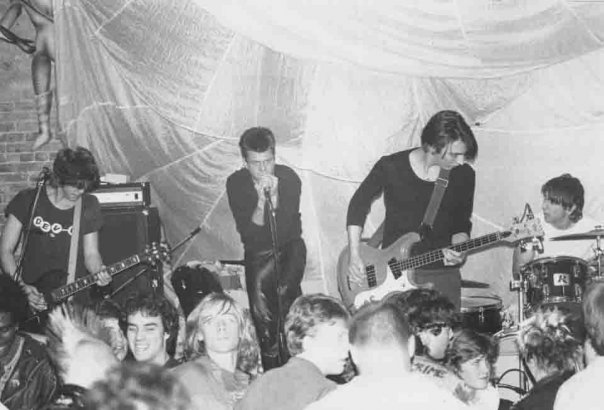
I didn’t enroll in college directly after graduating from high school. Instead I followed my impulse to dive into a teenage rebellion. I became part of the Seattle punk rock culture. One of the most positive outcomes of taking this unusual turn in my journey was that I started playing bass guitar. At first I played by myself in my room. Eventually I played in an amazing avant-garde punk band called Ten Minute Warning.
My growing interest in music led me to begin a formal study of music at a community college. At North Seattle Community College, I came in contact with a bass instruction manual by the master bassist Rufus Reid. One of the first things he taught in his book was that in order to get anywhere playing bass you have to like the sounds that you make. He emphasized that this was equally true for a beginner and a veteran. While studying music didn’t turn out to be my long-term path, the words of Rufus Reid have always stuck with me. And to me liking your sound is at the heart of the study of asana and the greater context of yoga in general. Liking how you express yourself in your postures is necessary in order to develop the discipline to rise each morning, get on your mat, and persist in encountering the many daily practice challenges. I teach this theme—liking your sound—in my classes, and recently someone emailed me this question about it.
Dear David,
What do we do with those poses that when, no matter how long we’ve been practicing, we just don’t like how we do them?
Here are my four strategies for working with postures where you don’t like your sound:
1) Dropping the need for the posture to look a certain way. It is amazing to observe the great lengths we will go to try and make ourselves do a posture in the way that we've decided (or been told) that it should look or be done. Our ego or the fear of inadequacy that we feel around not being able to do the posture the "right" way will cause us to make one of the four cardinal mistakes which is: trying to find pleasure in what is in fact painful. Often we get no pleasure because we are trying to do it like the set image we've created in our mind rather than allowing for something creative to happen. It is important to remember that when you are doing a posture you are aiming to be adaptable, to tap into the potential that the present moment holds for us. This means your posture will look different and feel different each day and that is what you want.
2) Remember the list of benefits that are associated with that challenging posture. If you work with sound biomechanical principles, you receive the same benefits from doing a posture regardless of how good it looks or how deep you are able to go into it. A stiff version of a back bend gives you the same benefits as a flexible back bend. Doing a stiff version of a back bend will be a less stiff attempt than if you did no back bend at all. In short, you have to trick yourself into liking what you are doing by remembering the benefits.
3) You need to have enough curiosity and skill to explore creative alternatives for doing each posture. Almost always there is some modified version of a posture that you can do where you can like your expression. Making use of a modified posture involves being humble enough to use blocks, a wall, or other means of getting to a satisfying and enjoyable place. Often the version of the posture that you will come to enjoy will look very different from the idealized version that you see other people doing in classes or posting pictures of on Facebook and/or Instagram. Give yourself permission to be creative and to research different ways of expressing a given posture.
4) Lastly, using the enjoyment (liking your sound) as a measure of success or skill in your posture is only a map that is meant to lead you to a certain territory. But don't mistake the map for the territory. One primary quality of territory you seek is the experience of UNITY where you no longer frame your tastes and perceptions in terms of anything that divides unity, such as pain and pleasure. You attempt to transcend duality. Here's poem from the Kashmiri saint Lalla that speaks to this idea:
If a seeker has an awareness of unity
Knowing the ideas of "I" and "this"
As well as pain and pleasure
as one undifferentiated whole,
he experiences the Lord of Immortality
Comments
No comments.